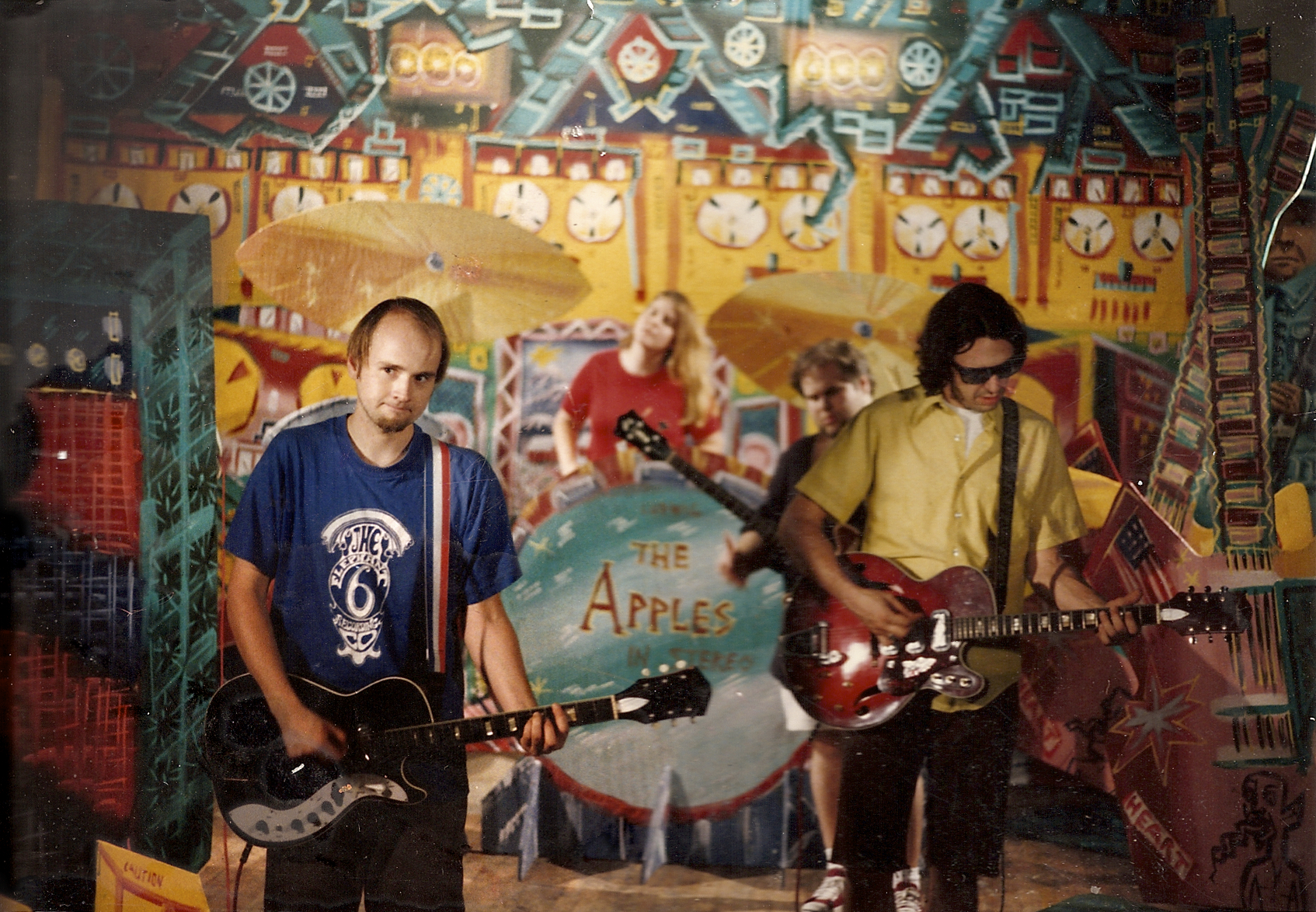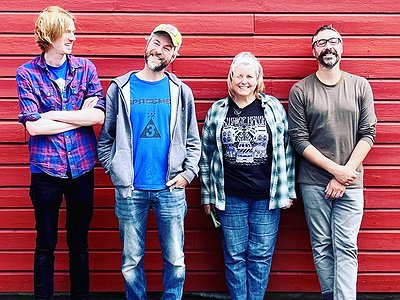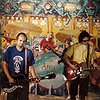Name: Hilarie Sidney
Occupation: Drummer, songwriter
Nationality: American
Recent release: As a member of Apples in Stereo and Secret Square, Hilarie Sidney is featured in C.B. Stockfleth's documentary The Elephant 6 Recording Co., "an Intimate Look at the Influential Indie Music Collective that Gave Rise to Neutral Milk Hotel, The Olivia Tremor Control, The Apples In Stereo, Elf Power, Of Montreal + Many More." More on the movie on the official Elephant6 homepage.
If you enjoyed this Hilarie Sidney interview and would like to find out more about her work and current projects, visit The High Water Marks on Facebook.
Where does the impulse to create something come from for you? What role do often-quoted sources of inspiration like dreams, other forms of art, personal relationships, politics etc. play?
The impulse to create something for me comes from an inner urge or need that I equate with happiness and satisfaction. My own happiness and well-being are strongly correlated with my ability to create something.
Personal relationships, dreams, and experiences can all be a source of inspiration. The High Water Marks song “Sixth of July” was created the day after an experience that meant something to me.
“I’ve Been Watching” by Secret Square is about a person who caused me to experience something.
Oddly, for the first time ever, I have just written two politically motivated songs.
For you to get started, do there need to be concrete ideas – or what some have called a 'visualization' of the finished work? What does the balance between planning and chance look like for you?
It is almost always chance. I am not super good with concrete ideas. I get self-conscious and feel that I’m being contrived, which halts my ability to do what I feel I can do best.
Chance and stream of consciousness is my go to.
Do you have certain rituals to get you into the right mindset for creating? What role do certain foods or stimulants like coffee, lighting, scents, exercise or reading poetry play?
I like to be alone in the house. Late morning or early afternoon is best.
First, I brew a pot of coffee, and then grab my guitar and start strumming. I like the feeling of being all alone and uninhibited.
What do you start with? How difficult is that first line of text, the first note?
I usually stumble upon a chord progression that grabs me and start humming over that. The first line of text can come super easy and quickly, but at other times it can be an endless struggle.
“Trouble from the East” on Your Next Wolf the latest record by the High Water Marks came flooding out of me as soon as I found the melody.
A similar thing happened with “Questions and Answers” by the Apples in Stereo.
When do the lyrics enter the picture? Where do they come from? Do lyrics need to grow together with the music, or can they emerge from a place of their own?
I always do music / melody first and then lyrics. My melodies have specific rhythmic cadences that I use to write the lyrics. The lyrics come from another space which I feel I don’t inhabit. That is when they are the best in my opinion.
I have some notes on my phone of phrases that I hear people say, or things that catch my ear. Sometimes I use that as a frame or use it as a challenge to make lyrics that will allow me to insert that phrase in it and use as a song title. An example is the High Water Marks song “Spectral Roommates.”
Per Ole (bandmate, writing partner and husband from the High Water Marks) said Spectral Roommates would be a fun name for a song. So, when I made the lyrics, I kept that phrase in my mind. In the end I felt that I had captured the phrase, even though the title is never mentioned in the lyrics.
Lyrics that come from a more concentrated effort or structure are quite tough and it is hard for me to come around to being ok with. But, if nothing else comes, you need to be okay with it.
What makes lyrics good in your opinion? What are your own ambitions and challenges in this regard?
I love lyrics that are surreal or are poetic in a way that you can find a lot of different meaning in them, or that you can make the meaning up yourself. I love lyrics that create images and ideas.
A High Water Marks song that I wrote called “Can You” has lyrics that were shimmery and random but created images for me. Later I came to realize that it was 100% about my struggle with depression.
I am not a super big fan of lyrics that tell a specific story about someone, though I have done them myself and find that they are ok sometimes. Another song of ours in the High Water Marks, “Ode to Lieutenant Glahn” is an example of this.
I wrote the song for a final project in a literature class on Knut Hamsun at university. So, naturally the lyrics needed to be about a character in one of his books, or about him. I chose Thomas Glahn, the protagonist of Pan. I had a lot of fun with that.
To quote a question by the great Bruce Duffie: When you come up with a musical idea, have you created the idea, or have you discovered the idea?
I would have to say discovered, haha. I mean, everything is out there in the air somewhere and we are just lucky enough to grab it and pluck it down. That’s a tough one though.
Many writers have claimed that as soon as they enter the process, certain aspects of the narrative are out of their hands. Do you like to keep strict control or is there a sense of following things where they lead you?
It’s almost always completely out of my hands. I need to be open to it and I always just let the idea lead me.
I am rarely pleased with the outcome when I try to lead the idea.
Often, while writing, new ideas and alternative roads will open themselves up, pulling and pushing the creator in a different direction. Does this happen to you, too, and how do you deal with it? What do you do with these ideas?
Over the last two records by the High Water Marks, the creative process took me into a direction that I hadn’t been privy to for a long time. I found myself making some sound collages, which I haven’t done since Secret Square.
There are two songs, one from the album Proclaimer of Things called “the Origins of Names” …
… and one from Your Next Wolf called “Forest Decomposing” which is a juxtaposition of the song “Boreal Forest” in imagery and sound.
Once a piece is finished, how important is it for you to let it lie and evaluate it later on? How much improvement and refinement do you personally allow until you're satisfied with a piece? What does this process look like in practice?
I don’t like to dwell on things or overthink them. I worry that they will become sterile.
Letting things lie, and evaluation are great for some people, but I personally really enjoy conveying that moment of inspiration in its pure form.
I have one evaluation of my songs, or perhaps more like a rule that I try to stand by. That is keeping songs on the shorter side. People have a short attention span (I do!) and pop songs are best leaving you wanting more, in my opinion.
What's your take on the role and importance of production, including mixing and mastering for you personally? How involved do you get in this?
In Secret Square the role of production was completely 4-track, lo fi, and psychedelic organic. We left the mixing and mastering up to Robert (Schneider) who is extremely talented at interpreting other people’s vision.
For an example, check out “Aerodynamic” by Secret Square.
In the Apples in Stereo, production was of the utmost importance. The parameters were quite specific and in line with certain aesthetics, such as the Beatles Recording Notes, Sgt. Pepper, Pet Sounds etc. But everything was done by Robert and not by outsiders. Mixing and mastering were both extremely important as well.
With the High Water Marks, we also record everything ourselves. We don’t live in the same place, so we do this remotely. Per Ole and I usually send our band mates Logan and Øystein the shell of our songs. Drum machine or click track, rhythm guitars and sometimes lead guitars, and scratch vocals (that sometimes end up being final). We build up from there. 
Apples in Stereo Interview Image by Tim Barnes
We are all very involved in the process and often discuss at length. Mixing has become something we carefully choose someone outside to do. Our latest release Your Next Wolf was mixed and mastered by Justin Pizzoferrato. He has recorded and mixed a lot of music we really like. So, all of that being said, for me, the importance of production is very important, and I want to be in control of it myself and have the final word.
But whether it’s recorded analog or digital, lo-fi or hi-fi for example have little importance to me. I find that going into a studio creates a lot of pressure. I like to take my time and see where ideas lead me without having a clock ticking and thinking about money. We could make complete demos and recreate them at a studio, but I don’t really see the point in that.
After finishing a piece or album and releasing something into the world, there can be a sense of emptiness. Can you relate to this – and how do you return to the state of creativity after experiencing it?
Yes! I call this “end of project depression.” I experience it to varying degrees depending on the point in time, but I ALWAYS experience it.
You go into a project with so many ideas, so much excitement, and expectations. And then suddenly it’s over. You have time to reflect on the things you were most happy with, and things you feel you could have done better. You suddenly have more time. Then there is also the long period of limbo between getting the master into your hands, and the release date.
I felt that heavily after the Apples in Stereo finished Discovery of a World Inside the Moone.
I largely equate that to the extreme circumstances of tracking that record. It’s the only record that we recorded at a studio like that. We lived in the studio, which was in Hartford Connecticut. The surrounding area was kind of depressing. I had a lot of anxiety caused by the engineer who exuded negativity, and the long days could be brutal.
You would think I would have had end of project euphoria, but I got a heavy case of the blues after that. An exhausted emptiness took hold. I took it out on everyone, which was terrible. I was terrible.
Luckily, the album came out beautifully, and I don’t know if any of the others felt like I did at the time. “Silver Chain” is a song that I wrote for that album.
Creativity can reach many different corners of our lives. Do you personally feel as though writing a piece of music is inherently different from something like making a great cup of coffee? What do you express through music that you couldn't or wouldn't in more 'mundane' tasks?
I think the creativity of a sewing project, or making a great cup of coffee for example is the kind of planned creativity that is insanely fun. It can take you to unexpected places, and happy accidents.
But writing music, or creating a piece of visual art (drawing, painting, etc.) comes from a completely different place in the universe. For me anyway. I have no idea what is going to happen, and there is no planning.
It’s a beautiful mystery.





